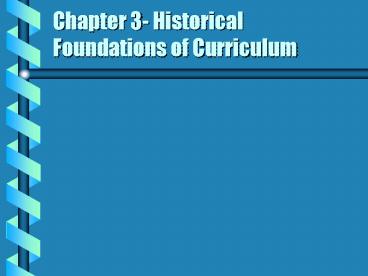Chapter 3 Historical Foundations of Curriculum - PowerPoint PPT Presentation
1 / 12
Title:
Chapter 3 Historical Foundations of Curriculum
Description:
Chapter 3- Historical Foundations of Curriculum. The Colonial Period:1642-1776 ... The Hornbook. The New England Primer. The National Period: 1776-1850. Benjamin Rush ... – PowerPoint PPT presentation
Number of Views:4962
Avg rating:3.0/5.0
Title: Chapter 3 Historical Foundations of Curriculum
1
Chapter 3- Historical Foundations of Curriculum
2
The Colonial Period1642-1776
- Massachusetts- Old Deluder Satan Act of 1647
- Middle Atlantic
- South
3
Colonial Schools
- Town School
- Parochial and private Schools
- Latin Grammar Schools
- Boston Latin Grammar School 1635
- The Academy
- College
4
Textbooks and Readers
- The Hornbook
- The New England Primer
5
The National Period 1776-1850
- Benjamin Rush
- Thomas Jefferson
- Noah Webster
- William Holmes McGuffey
- McGuffey Readers
6
Nineteenth-Century European Educators
- Pestalozzi
- Froebel
- Herbart
- Spencer
- What knowledge is most worth?
7
Universal Education
- Monitorial Schools
- Common Schools
- The Academy
- The High School
- James Conant
8
The Transitional Period 1893-1918
- Committee of Fifteen on Elementary Education
- Committee of Ten on Secondary School Studies
- Committee on College Entrance Requirements
9
A Modern Curriculum
- Flexner
- Dewey
- Judd
- Commission on the Reorganization of Secondary
Education - Cardinal Principles
10
Seven Cardinal Principles
- Health
- Command of the Fundamentals
- Worthy Home Membership
- Vocation
- Citizenship
- Leisure
- Ethical Character
11
Curriculum as a Field
- Bobbitt and Charters
- Kilpatrick
- The Twenty-Sixth Yearbook
- Rugg and Caswell
- Eight Year Study
- Tyler
12
Tylers Basic Principles
- What educational purposes should the school seek
to attain? - What educational experiences can be provided that
are likely to attain these purposes? - How can these educational experiences be
effectively organized? - How can we determine whether these purposes are
being attained?































